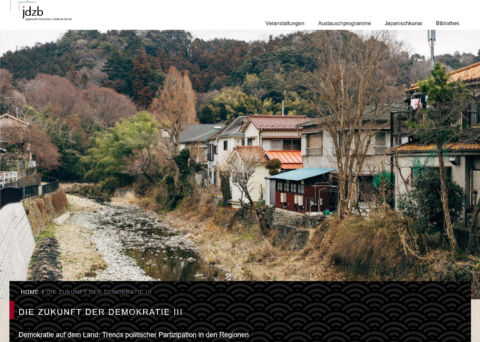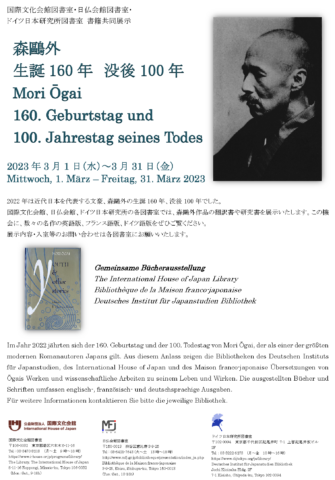イベント&アクティビティ
International Workshop explores holistic multispecies worldviews

With the Global Financial Crisis of 2007/08, the Covid-19 pandemic, and the Russian invasion of Ukraine, the opening decades of the 21st century has already been a period of global crises. While these crises emerged out of different spheres of human activity, they have demonstrated the transnational economic, political, and social interconnectedness of human societies, as well as the connections between the human and non-human worlds, and between the realms of ideas and physical existence. The philosophical traditions of South, East, and Southeast Asia know the metaphor of Indra’s Net to express the fundamental interconnectedness and interdependence of all existence. Inspired by this frame, the workshop Caught yet blind in Indra’s Net: Reflections on Interconnected Crises in the Late Capitalist Anthropocene explores holistic multispecies worldviews and critically connects recent theoretical debates to case studies in order to advance programs for achieving social and environmental justice. Details here
DIJ Study Group session on ‘Diversity of Japanese Churches’

Ever since the Catholic mission to Japan in the 16th century, Christianity has upheld its presence in the Japanese society. While many churches such as the Japanese Lutheran Church are still connected to Christian (missionary) organisations overseas, there are a few Japanese (indigenous) churches founded by Christian intellectuals that aimed for an independent development of Japanese Christianity without the influence of Western actors. These independent churches are known for their history, their theological and intellectual approaches to Christian ethics and society. Based on on-going fieldwork in various Japanese congregations and inspired by the material turn, this talk by Dunja Sharbat focuses on the materiality of Japanese independent churches in present-day Japan. Considering the history and current situation of these churches, she will discuss their socio-spatial arrangements and compare it to other Japanese churches in order to analyse differences and similarities in their materiality. Details and registration here
Dunja Sharbat, Ruhr-University Bochum
Online lecture on Japan’s carbon pricing policy by DIJ director Franz Waldenberger

The introduction of greenhouse gas emission rights and their allocation through trading schemes (“carbon markets”) is considered an essential policy tool to achieve the ambitious net-zero emission goals, to which countries – including Japan – have committed under the Paris Agreement. Japan has so far not established carbon markets on a national scale. Also, its carbon tax introduced in 2012 has remained ineffectively low. The presentation “Carbon Pricing – Why is Japan lagging behind?” by DIJ director Franz Waldenberger will discuss why carbon pricing has so far not been used within Japan’s climate policy framework. It will also try to assess to what extent the absence of a national emission trading scheme has impacted Japan’s ability to achieve the 2050 net-zero goals. This online presentation is part of the lecture series at Goethe University Frankfurt’s Center for Financial Studies. Details and registration here
DIJ co-sponsors hybrid book talk on Japan’s Nuclear Disaster

In this book talk, Florentine Koppenborg (Technical University of Munich) argues that the regulatory reforms after the Fukushima disaster on March 11, 2011, directly and indirectly raised the costs of nuclear power in Japan. The new Nuclear Regulation Authority resisted capture by the nuclear industry and fundamentally altered the environment for nuclear policy implementation. Independent safety regulation changed state-business relations in the nuclear power domain from regulatory capture to top-down safety regulation, which raised technical safety costs for electric utilities. Antinuclear protests, – mainly lawsuits challenging restarts – incurred additional social acceptance costs. Increasing costs undermined pro-nuclear actors’ ability to implement nuclear power policy and caused a rift inside Japan’s “nuclear village.” Small nuclear safety administration reforms were, in fact, game changers for nuclear power politics in Japan. The book talk takes place on May 30, 6.30 pm at Temple University’s Japan Campus and online. Details and registration here
Joint DIJ and JDZB conference ‘Countryside Democracy in Japan and Germany’

On the occasion of the nationwide local elections in prefectures and municipalities in Japan in April 2023, experts and political activists from Japan and Germany will discuss opportunities, trends, and challenges as well as similarities and differences between the two countries. Specifically, the conference Countryside Democracy in Japan and Germany: Trends in Political Participation will address the following questions: How does a vital democracy manifest itself in rural regions? What opportunities for co-determination and political participation exist in contrast to urban centers, especially for younger people? How is political and social participation evolving, for example through digital forms of involvement? Or do we observe an increasing “disenchantment with politics”? Participants include DIJ political scientist Sebastian Polak-Rottmann as panelist, DIJ alumnus Yosuke Buchmeier as moderator, alumna Gabriele Vogt as commentator, and deputy director Barbara Holthus. The conference is jointly organized by the DIJ and the Japanese-German Center Berlin (JDZB). It takes place online on May 11, 17-19h JST. Conference languages are German and Japanese with simultaneous interpretation. Details here
DIJ hosts ‘Transnational Research in a Multipolar World’ conference
 Transnational research plays an essential role in global knowledge production. It also fosters mutual understanding and trust among the countries involved. This is especially true for transnational research in the social sciences and humanities, which explicitly aims at bridging and combining different national perspectives on issues of shared interest. On May 8-9, together with Sophia University Graduate School of Global Studies the DIJ will host the Max Weber Foundation conference ‘Transnational Research in a Multipolar World’ to discuss the impact of the growing geopolitical tensions on transnational research. Particular foci will be on the limitations to scientific research in autocratic regimes; the response of national research organizations and universities to these challenges; and, taking the example of gerontology and gender studies, the response of humanities and social science research to societal challenges. The second day will focus on Eastern Europe, the Middle East, and the Indo-Pacific to explore common topics as well as new formats of transnational research against the background of ongoing geopolitical shifts. The conference will end with a keynote speech on world history made in Japan by Iokibe Kaoru (University of Tokyo). Details and registration here
Transnational research plays an essential role in global knowledge production. It also fosters mutual understanding and trust among the countries involved. This is especially true for transnational research in the social sciences and humanities, which explicitly aims at bridging and combining different national perspectives on issues of shared interest. On May 8-9, together with Sophia University Graduate School of Global Studies the DIJ will host the Max Weber Foundation conference ‘Transnational Research in a Multipolar World’ to discuss the impact of the growing geopolitical tensions on transnational research. Particular foci will be on the limitations to scientific research in autocratic regimes; the response of national research organizations and universities to these challenges; and, taking the example of gerontology and gender studies, the response of humanities and social science research to societal challenges. The second day will focus on Eastern Europe, the Middle East, and the Indo-Pacific to explore common topics as well as new formats of transnational research against the background of ongoing geopolitical shifts. The conference will end with a keynote speech on world history made in Japan by Iokibe Kaoru (University of Tokyo). Details and registration here
Joint book exhibition on Mori Ōgai

The year 2022 marked the 160th anniversary of the birth and 100th anniversary of the death of Mori Ōgai, who is considered one of the greatest modern Japanese novelists. To celebrate both anniversaries, the International House of Japan Library, the Bibliothèque de la Maison franco-japonaise, and the Deutsches Institut für Japanstudien Bibliothek are displaying translations of Ōgai’s works and critical studies in English, French, and German. For more information on opening times and entry regulations, please contact our library. Details here
Franz Waldenberger to discuss Japan’s productivity puzzle at MFJ lunch webinar

Given its rapidly aging society, Japan will need to increase labour productivity in order to sustain its current income levels. Value added per hour worked has been increasing over the last 30 years in Japan, but it remains very low in comparison to other OECD countries. In 2021, it was below 60% of the US level. This is rather surprising given Japan’s excellent resource conditions: a high education level of its workforce; high investment in research and development; and relative abundance of capital. In this online presentation, DIJ director Franz Waldenberger will try to resolve Japan’s productivity puzzle and discuss how productivity could be increased. His talk is part of the Lunch Webinar on Japanese Economy and Society organized by the French Research Institute on Japan at the Maison franco-japonaise (MFJ). It takes place on April 21, from 12.30 to 14h. Details and registration here

















 Open Access
Open Access
